► Interview from 2015
► Just after the first hybrid championship
► Mercees now have 6 WCC and WDC in the last ten years
A year after Niki Lauda’s death, we’re looking back to this interview from the CAR archives. Published just after Mercedes’ first dominant season in the hybrid area, it’s a snapshot of the just one facet of the man, Niki Lauda the retired champion, and Lauda team leader.
Topics include the signing of Lewis Hamilton, to future domination and ‘that’ incident at Spa – but it’s clear to why Mercedes continued their success under Wolff and Lauda’s leadership.
Lauda on 2014 ‘we could have done better, we screwed up two races’
That’s bullshit!’ If you didn’t know Niki Lauda, you’d be slightly taken aback by his opening gambit as we sit down to talk. He fires the words at me aggressively as a retort to the suggestion that Mercedes’ total domination this year has been bad for Formula One.
‘And I’ll tell you why that’s bullshit,’ he says. We had two great drivers fighting it out in identical cars this year, which is more exciting than having drivers from different teams doing the same because neither Nico nor Lewis could rely on a car advantage.
It came down to driving skill and the best guy won. It was like Senna and Prost, or Lauda and Prost at McLaren; the best battles are the ones when the drivers are fighting in the same team.’
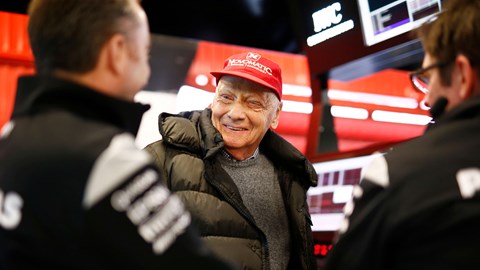
During our 20-minute conversation at the Abu Dhabi Grand Prix, Niki uses the word ‘bullshit’ seven times. It’s his reflex adjective; anything he doesn’t like is ‘bullshit’. Double points is bullshit; people predicting the demise of Bernie Ecclestone are full of bullshit; even people writing off Sebastian Vettel are talking bullshit.
Niki’s language has always been colourful and he’s never been short of an opinion, which is why he’s such a popular member of F1’s Establishment. He says what he thinks and always has done, ever since he made his F1 debut at the 1971 Austrian Grand Prix.
These days he attends every race as non-executive chairman of Mercedes Grand Prix. He’s also a pundit for RTL, Germany’s terrestrial F1 broadcaster, but that’s not his priority – as he proved in the aftermath of the Abu Dhabi season finale. When the BBC’s Suzi Perry approached him for a few words, he gave RTL anchorman Florian Konig ‘the bird’ live on air and walked off to talk to the Beeb.
It’s Niki’s work with Mercedes that he gets most recognition for these days. He’s overseen the team’s rise from fifth in the constructors’ championship in 2012 to dominant victors this year, albeit from his home in Vienna rather than the team’s HQ in Brackley. Niki has Toto Wolff on-site to oversee day-to-day niggles, freeing him up to deal with the bigger picture.
For example, it was Niki who lured Lewis Hamilton to the team at the end of 2012 when, at the time, McLaren still seemed the better bet because they’d finished two places ahead of Mercedes in that year’s constructors’ championship. ‘Thank God I got Lewis,’ says Niki.
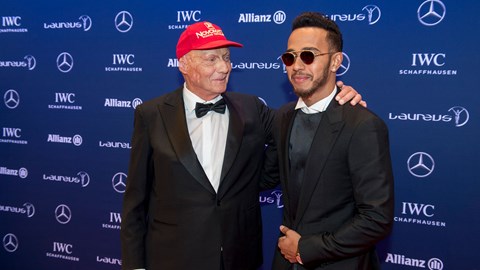
‘He’s an outstanding guy and a brilliant driver. I knew he was the right person for us, so I started talking to him even before Schumacher had made a decision about his future and whether or not to retire. We had to plan for the future, both in terms of drivers and the new regulations, and that’s what we did.’
Lewis took a while to bed into the team. He claimed that last year’s car was more suited to Nico’s driving style than his own, but he still impressed with five pole positions and a dominant victory in the Hungarian Grand Prix. From the outset, though, the collaboration has focused on 2014, and such foresight has paid off.
‘There are many reasons why we’ve been dominant this year,’ says Niki. ‘The main one is the change to the rules because we did the best job with the new power unit, but we also had the best chassis and we maintained a strong rate of development throughout the year.
When we put on a big aero upgrade at the Singapore Grand Prix, we knew that we wouldn’t be caught before the end of the year and that was very satisfying.’ The W05 was impressive from the outset of winter testing, but it was only at the first race in Melbourne, where Nico Rosberg won at a canter, that the world became fully aware of the car’s true potential.
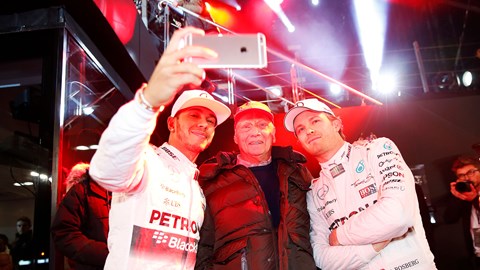
‘I wasn’t pushing at all,’ says Nico, when asked to reflect on that race, ‘but I was still pulling away from [Daniel] Ricciardo. It was amazing! Although Lewis didn’t finish that race, it was in Australia that I realised the title fight was probably going to be between me and him, and no-one else.’
The Mercedes drivers took 16 wins (a new record), 11 for Lewis and five for Nico, and they wrapped up the constructors’ title with three races remaining. Ricciardo, their closest challenger, won three races, but he finished 146 points adrift of Hamilton and the Aussie admitted at season’s end that he never really thought the title was on for him this year.
‘My only objective this year was to leave nothing on the table,’ says Ricciardo. ‘I wanted to get on the plane at the end of each race weekend knowing that I’d done the maximum, which I think I did. Mercedes were on another level from everyone else and no-one could have realistically beaten Nico or Lewis this year. They were too strong.’
When I pass on Ricciardo’s thoughts to Lauda, he smiles and rams the point home with some finger pointing. ‘Our objective was to win every bloody race,’ he says, pointing at my chest. ‘We were pissed off when we didn’t. We could have done better because we screwed up two races. There was Spa, where our drivers hit each other, and we could have done better strategically at Budapest.’
Given the furore after the Belgian Grand Prix, it’s interesting that Niki reckons Lewis and Nico hit each other. Rosberg tried to pass Hamilton for the lead at Les Combes and he punctured Lewis’s right rear tyre with his front wing, leading to Lewis’s retirement. Hit each other, Niki?
‘That’s bullshit,’ he says, smiling. ‘Nico hit Lewis! But what pisses me off about the whole thing is that it was a normal racing incident. No-one would have worried if it had happened between us and Red Bull; nobody would have said a word about it. But because we were so dominant, and because our target was to win every f**king race, it became a big thing. Nico screwed up, and that’s it. It happens in racing.’
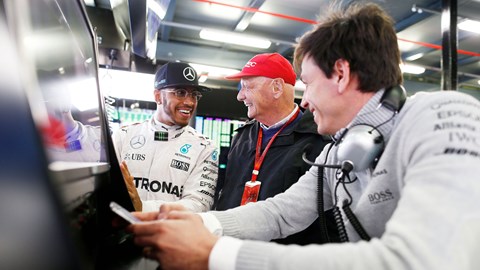
If Spa was one of the defining moments of the 2014 season, after which tension between Nico and Lewis bubbled over, so too was Monaco, where Rosberg ruined Lewis’s chance of taking pole position. And we all know how hard it is to overtake around the streets of the Principality.
Rosberg’s error in the dying moments of Q3, and the resultant yellow flags, prevented Hamilton from wrestling pole away from the German. Lewis reckoned Rosberg had done it on purpose; Nico said it was an innocent mistake that had seen him out-brake himself on the approach to Mirabeau. The stewards sided with Nico, but there was an undercurrent of foul play that riled Hamilton.
‘What happened at Monaco is normal,’ says Niki. ‘It’s what racing drivers do. Nico says he didn’t do anything wrong; Lewis says he did. But it was Nico on pole position, and it was Nico who won the race, so it was the right thing for him to do. If Lewis had nailed his first lap of Q3 he would have been on pole and it would have been a different story.’
Those aren’t the comforting words that Lewis will have wanted to hear, but he will also have known that Niki was right. The racer’s brain in him will have been angry at leaving the door ajar for Rosberg to play games –if indeed he did. What’s extraordinary is that Lewis didn’t change his approach to qualifying for the remainder of the season. More often than not, he followed Rosberg on their final qualifying laps and that left him repeatedly vulnerable to yellow flags.
Unsurprisingly perhaps, Nico outqualified him by 11 poles to eight over the season.But there were undoubted improvements to Lewis’s armoury. David Coulthard refers to a ‘Buddha-like calm’ descending over Hamilton and there’s no doubt that his approach was more measured from the get-go.
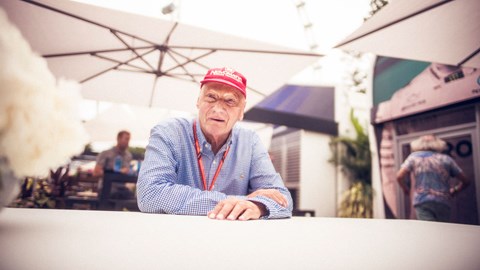
When a technical failure put him into the barriers on day one of pre-season testing, he told the media that it had been a positive day; after the mechanical failure in Melbourne that saw him drop 25 points behind Rosberg, he remained remarkably sanguine and went on to win the next four races.
‘Lewis has been different,’ says Lauda. ‘He took the decision at the start of the season to concentrate fully on driving the car. He turned up at the races on his own, whereas in the past there were the dogs, the family and the girlfriends. Without any disturbances he’s been more relaxed because he has more time to focus on the job. That’s why he won 11 races.’
Rosberg’s reputation has grown this year too. He’s graduated from number two driver to A-list megastar, partly as a result of being the first driver to outqualify Hamilton over a season. His deep technical understanding has also helped to drive forward the development of the car.
‘Nico has proved this year that he can drive as quickly as Lewis,’ says Niki. ‘But if he gets beaten, which happened a couple of times this year, he bounces back and that makes him very rare. He drives without emotions. Look at the difference between Austin and Brazil; he bounced back very impressively in the space of a week.
‘And let me tell you something else: both of our drivers want the same thing from the car, which helps development. I tell you, we have the best driver pairing on the grid.’ Scarily, perhaps, the omens look as good for Mercedes in 2015 as they were this year. They ended this season 0.5sec clear of the field and the word from Mercedes High Performance Engines is that they’ve found a horsepower improvement equivalent to a second a lap.
Technical chief Aldo Costa says there are improvements on the chassis side too. ‘We’ve only just got started,’ says Lauda. ‘There’s more to come, both in terms of car performance and the level of the drivers. Nico and Lewis can get better and after a break I can see them coming back stronger.’
At this point, Niki’s chum Gerhard Berger wanders over and starts chatting about the young Spaniard Carlos Sainz, just named as Toro Rosso’s second driver for 2015. ‘Tell me about him,’ says Lauda, and with that he doffs his red hat in my direction and heads into the bowels of the Mercedes hospitality unit with Berger, the interview over as abruptly as it began.
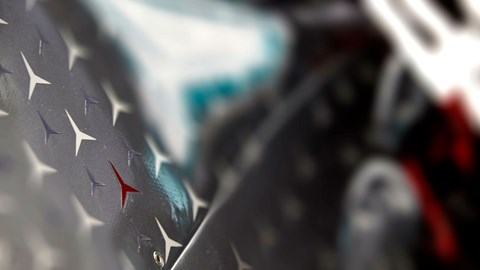
LAUDA:A LIFE ***
- GPs: 177
- Debut: Austria 1971
- Championships: 3
- Wins: 25
- Podiums: 54
- Poles: 24
- 1974 Signed to drive for Ferrari
- 1975 Won first F1 world title
- 1976 Badly burned in German GP crash
- 1977 Second F1 title for Ferrari
- 1979 Quit F1 and set up Lauda Air
- 1982 Returned to F1 with McLaren
- 1984 Third F1 title
- 1985 Retired
- 1993 Joined Ferrari as consultant
- 2001 Joined Jaguar F1 as team manager
- 2012 Joined Mercedes F1